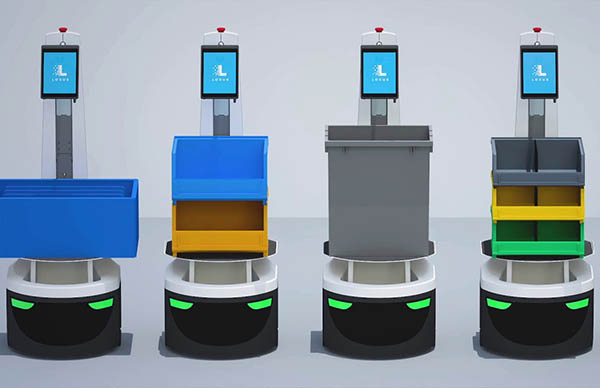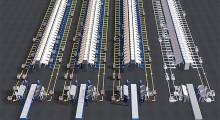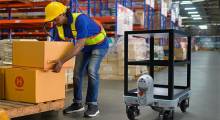Mobile robot providers are continuing to scale up to meet supply chain and e-commerce demand. Locus Robotics Corp. today announced that it has secured an additional $50 million in investment from Tiger Global Management LLC. Wilmington, Mass.-based Locus said it will use the funding to facilitate continued expansion into new markets worldwide, as well as to meet the needs of its growing customer and partner ecosystem.
“At a time of increasing volumes and ongoing labor shortages, this new round of funding underscores how critical flexible, scalable, intelligent robotics automation has become to the warehouse and the supply chain,” stated Rick Faulk, CEO of Locus Robotics. “Locus is uniquely positioned to drive digital transformation in this enormous global market.”
Locus Robotics said its multi-robot solution includes autonomous mobile robots (AMRs) that can collaborate with human warehouse workers to double or triple piece-handling productivity. The company claimed that its LocusBots achieve this increase with less labor than traditional piece-handling systems.
Locus added that its technology can help retailers, third-party logistics providers (3PLs), and specialty warehouses efficiently meet or exceed the increasingly complex demands of fulfillment environments. In addition, the company said its robots can easily integrate into existing warehouse infrastructures without disrupting workflows.
This year, Locus Robotics marked a half-billion units picked and made the list of Inc. 500, ranking No. 428.
“We've almost doubled in size in the past year,” said Kary Zate, senior director of marketing communications at Locus. “Our customer base has also grown in the past two years.”
“Among the things that make Locus different are the labor management data and real-time reporting to support operators,” he told Robotics 24/7. “We've also expanded putaway as a function. There's a two-way aspect; it's not just picking.”
Tiger Global continues support of Locus
This additional funding adds to the investment made by Tiger Global Management in Locus’ Series E round in February.
“We are impressed by Locus Robotics' proven technology, flexible design, and customer obsession,” said Griffin Schroeder, partner at Tiger Global. “As their warehouse partners face rapidly growing e-commerce volumes, rising labor costs, and increasingly demanding customers, Locus will be ready to provide solutions that work.”
Tiger Global invests on private and public companies in the global Internet, software, consumer, and payments industries. The firm was founded in 2001, and it launched its private equity strategy in 2003. Tiger Global said it has invested in hundreds of companies across more than 30 countries, in all stages of funding – from Series A to pre-IPO.
The firm's venture business is currently investing its twelfth fund. It cited entrepreneur partners such as JD.com, Meituan, Facebook, LinkedIn, Toast, Stripe, ByteDance, Warby Parker, Flipkart, and DiDi. Tiger Global is based in New York and has affiliate offices in Hong Kong, Beijing, Singapore, and Bangalore.
Mobile robot market keeps rolling
Mobile robot companies have raised more than $1 billion so far this year. Top deals included GreyOrange's planned $500 million initial public offering (IPO), Zebra Technology's acquisition of Fetch Robotics for $290 million, Locus' $150 million Series E, and ForwardX's $38 million Series B round.
The global market for mobile robots (including automated guided vehicles or AGVs) will experience a compound annual growth rate (CAGR) of 15.34%, growing from $11.4 billion (U.S.) in 2019 to $30.96 billion by 2026, according to Research and Markets. It attributed this growth to increasing demand, labor constraints, and increasingly efficient management software for different industry applications.
Similarly, Mordor Intelligence predicted a 15.12% CAGR between 2018 and 2026. It noted growing AMR adoption in the automotive, healthcare, and oil and gas sectors. The biggest mobile robot transaction last year was Geek+'s closing of its $200 million Series C round.
Fortune Business Insights was even more bullish, predicting a CAGR of 23.7% and AMR growth from $1.97 billion in 2021 to $8.7 billion in 2028. Interact Analysis said it expects revenues for collaborative mobile robots to grow 50% this year.
While the research analyst estimates vary widely, there is consensus that the boom in e-commerce and workforce shortages during the COVID-19 pandemic will continue to drive AMR adoption.
About the Author
Follow Robotics 24/7 on Linkedin
Article topics
Email Sign Up


















